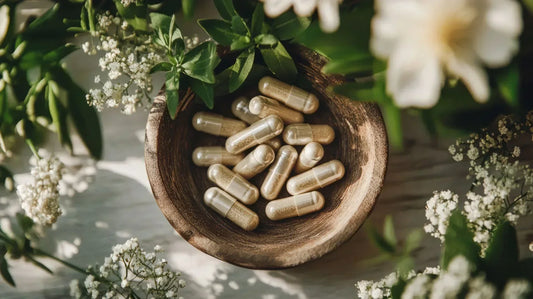Table of Contents
Antioxidants help protect your body from damage caused by free radicals, which can speed up aging and cause health problems. Taking the best antioxidant supplements can support your health, energy, and even your skin as you get older.
Some of the top antioxidant supplements to know about include:
-
Glutathione
-
Vitamin C
-
Vitamin E (Mixed Tocopherols)
-
Coenzyme Q10 (CoQ10)
-
Astaxanthin
-
Alpha-Lipoic Acid (ALA)
-
Resveratrol
-
Quercetin
-
EGCG (from Green Tea Extract)
-
Lycopene
In this article, we will explain what antioxidants are, explore their key benefits, and share how these supplements can help you stay healthier for longer.
NMN + Resveratrol
Cellular NAD+ booster with ultra‑pure NMN and Resveratrol, at research‑backed doses.*
What Are Antioxidants?
Antioxidants are natural substances that help protect your cells from damage caused by free radicals. Free radicals are unstable molecules that can harm your body’s cells and tissues.
They are produced naturally through processes like breathing and digestion, but they can also come from outside sources such as pollution, smoking, and sun exposure.
When free radicals build up, they can cause something called oxidative stress. Over time, oxidative stress can contribute to aging and many health problems, including heart disease and cancer. Antioxidants help neutralize these free radicals before they cause too much harm.
Several studies have shown the importance of antioxidants. Research published in the Journal of Nutritional Biochemistry suggests that antioxidants from fruits and vegetables are linked to better heart health and lower inflammation (1).
Another study in the Archives of Biochemistry and Biophysics shows how antioxidants protect against cell damage caused by everyday exposure to stressors (2).
What Are the Benefits of Antioxidants?
 Antioxidants are often linked to better health because they protect your body from the damage caused by free radicals. While we still need more research to understand exactly how supplements work, there is strong evidence that getting enough antioxidants through food can support many areas of your health.
Antioxidants are often linked to better health because they protect your body from the damage caused by free radicals. While we still need more research to understand exactly how supplements work, there is strong evidence that getting enough antioxidants through food can support many areas of your health.
Here are some of the top benefits of antioxidants:
Cancer prevention support: Some studies suggest that antioxidants may help reduce damage to cells that could lead to cancer (3). However, the evidence is not fully clear, and the benefits appear to be stronger when antioxidants are consumed through foods rather than supplements.
Eye health: Antioxidants like vitamins C and E may lower the risk of age-related eye conditions such as macular degeneration and cataracts, helping protect your vision as you age (4).
Heart health: Eating antioxidant-rich foods has been linked to a lower risk of heart disease and stroke. Early research points to antioxidants playing a role in this protection, though supplements have not shown the same results (5).
Healthier skin: Antioxidants may help improve the appearance of wrinkles, protect skin from sun damage, and reduce dark spots. Vitamin C and vitamin E, when used properly, can make skin softer and more resilient (6).
- Better overall nutrition: Foods rich in antioxidants are usually high in fiber, low in unhealthy fats, and packed with important vitamins and minerals, which support general wellness.
10 Best Antioxidant Supplements
Choosing the best antioxidant supplement can help protect your cells, support your heart, brain, and skin, and keep you feeling your best. Here are some of the top antioxidant supplements backed by research.
1. Glutathione
Glutathione is often called the "master antioxidant" because it helps regenerate other antioxidants in the body and supports detoxification. It plays a key role in fighting oxidative stress and protecting cells from damage.
Studies have found that higher glutathione levels are linked to better immune function and healthier aging (7). Some people prefer to take N-acetylcysteine (NAC), which helps the body make more glutathione naturally.
2. Vitamin C
Vitamin C is one of the most well-known antioxidants. It helps protect cells, supports the immune system, and plays an important role in collagen production for healthy skin and joints.
Research has shown that vitamin C can lower oxidative stress, reduce inflammation, and even help slow down the progression of age-related eye conditions. Liposomal forms of vitamin C are often recommended for better absorption.
3. Vitamin E (Mixed Tocopherols)
Vitamin E is a fat-soluble antioxidant that helps protect cell membranes from damage. It also supports heart health, immune function, and skin repair.
Studies suggest that people with higher vitamin E levels may have lower risks of heart disease and better skin health. It is best to choose mixed tocopherols for a more complete form of vitamin E.
4. Coenzyme Q10 (CoQ10)
CoQ10 is a powerful antioxidant that supports energy production in the cells, especially in the heart and muscles. It also protects cells from oxidative damage.
Research has found that CoQ10 supplementation can help improve heart function, reduce fatigue, and lower oxidative stress, particularly in older adults (8). Ubiquinol is the more active and easily absorbed form.
5. Astaxanthin
Astaxanthin is a naturally occurring antioxidant found in algae. It is known for its ability to protect skin, eyes, and joints from oxidative damage.
Studies have found that astaxanthin can improve skin elasticity, reduce wrinkles, and protect the skin from sun damage. It is often referred to as one of the most powerful natural antioxidants (9).
6. Alpha-Lipoic Acid (ALA)
Alpha-lipoic acid is unique because it works in both water and fat environments, helping protect all parts of the cell. It also helps regenerate other antioxidants like vitamin C and vitamin E.
Studies suggest that ALA can improve blood sugar control, reduce inflammation, and protect nerve health (10). It is sometimes recommended for people managing diabetes-related nerve damage.
7. Resveratrol
Resveratrol is a plant compound found in red grapes, berries, and peanuts. It has strong antioxidant properties and supports heart, brain, and metabolic health.
Research has shown that resveratrol can activate longevity genes and reduce inflammation (11). However, it is quickly broken down in the body, so look for supplements that offer enhanced absorption.
8. Quercetin
Quercetin is a flavonoid found in many fruits and vegetables, especially onions and apples. It is known for its strong antioxidant and anti-inflammatory effects.
Studies have found that quercetin can help lower blood pressure, reduce allergy symptoms, and protect the body against oxidative stress (12). It often works even better when combined with vitamin C.
9. EGCG (from Green Tea Extract)
EGCG, or epigallocatechin gallate, is the main antioxidant in green tea. It is known for supporting metabolism, heart health, and brain function.
Research suggests that EGCG can reduce inflammation, protect brain cells, and help maintain healthy cholesterol levels (13). Green tea extract supplements often provide higher concentrations than drinking tea alone.
10. Lycopene
Lycopene is a red pigment and antioxidant found in tomatoes and other red fruits. It is especially good for protecting the skin and supporting prostate health.
Studies have found that lycopene can lower the risk of certain cancers and improve heart health by reducing oxidative stress (14). It is best absorbed when eaten or taken with healthy fats like olive oil.
Are There Any Side Effects of Antioxidant Supplements?
Most antioxidant supplements are safe for healthy adults when taken at the right doses. However, taking very high amounts of certain antioxidants, like vitamin E or beta-carotene, may cause unwanted side effects or even raise health risks in some cases.
Some studies have found that extremely high doses of antioxidants might upset the natural balance of free radicals in the body (15).
Instead of protecting cells, they could actually interfere with important processes or weaken the immune system. This is why it is best to get antioxidants mainly from a healthy diet and use supplements carefully when needed.
Certain antioxidants may also interact with medications. For example, high doses of vitamin E could increase bleeding risk if you are taking blood thinners.
It is always a good idea to talk to your healthcare provider before starting any new supplement, especially if you have existing health conditions or take regular medication.
Best Antioxidant Foods
-v1745901329222.webp) While supplements can help, getting antioxidants through your diet is still one of the best ways to support your health. Here are some foods naturally rich in antioxidants:
While supplements can help, getting antioxidants through your diet is still one of the best ways to support your health. Here are some foods naturally rich in antioxidants:
Berries like blueberries, strawberries, and raspberries
Dark leafy greens such as spinach and kale
Nuts and seeds including walnuts and sunflower seeds
Tomatoes, rich in lycopene
Dark chocolate, with high levels of flavonoids
Green tea, a great source of EGCG
Colorful vegetables like carrots, sweet potatoes, and bell peppers
Citrus fruits such as oranges and lemons for vitamin C
Adding a variety of these foods to your daily meals can help your body naturally fight oxidative stress.
How to Take Antioxidant Supplements
When taking antioxidant supplements, it is important to follow the recommended dose listed on the product or suggested by your healthcare provider.
More is not always better. Taking too much can sometimes have the opposite effect and harm your health rather than help it.
Many antioxidants, like vitamin E, CoQ10, and astaxanthin, are fat-soluble. This means they are better absorbed when taken with a meal that contains some healthy fat, like avocado or olive oil.
Water-soluble antioxidants, like vitamin C, can be taken with or without food, but they work best when used consistently.
If you are combining several supplements, try to space them out during the day rather than taking them all at once. This can help your body absorb them better and lower the chance of side effects like stomach discomfort.
Conclusion
Antioxidants are an important part of keeping your body healthy and strong. They help protect your cells from damage, support your immune system, and may even slow down some signs of aging.
Getting antioxidants through a mix of healthy foods and carefully chosen supplements is a smart way to support your long-term health.
When choosing supplements, it is important to focus on real antioxidants like vitamin C, glutathione, astaxanthin, and CoQ10, which are backed by solid research.
Always aim for balance and talk to a healthcare provider if you are unsure about the best choices for your needs.-(1)-v1745901892974.webp) If you are looking for trusted supplements, you might like the Omre NMN + Resveratrol for energy and healthy aging support, or Omre Quercetin + Fisetin for immune and antioxidant defense.
If you are looking for trusted supplements, you might like the Omre NMN + Resveratrol for energy and healthy aging support, or Omre Quercetin + Fisetin for immune and antioxidant defense.
You can check availability and find a good fit for your wellness goals.





